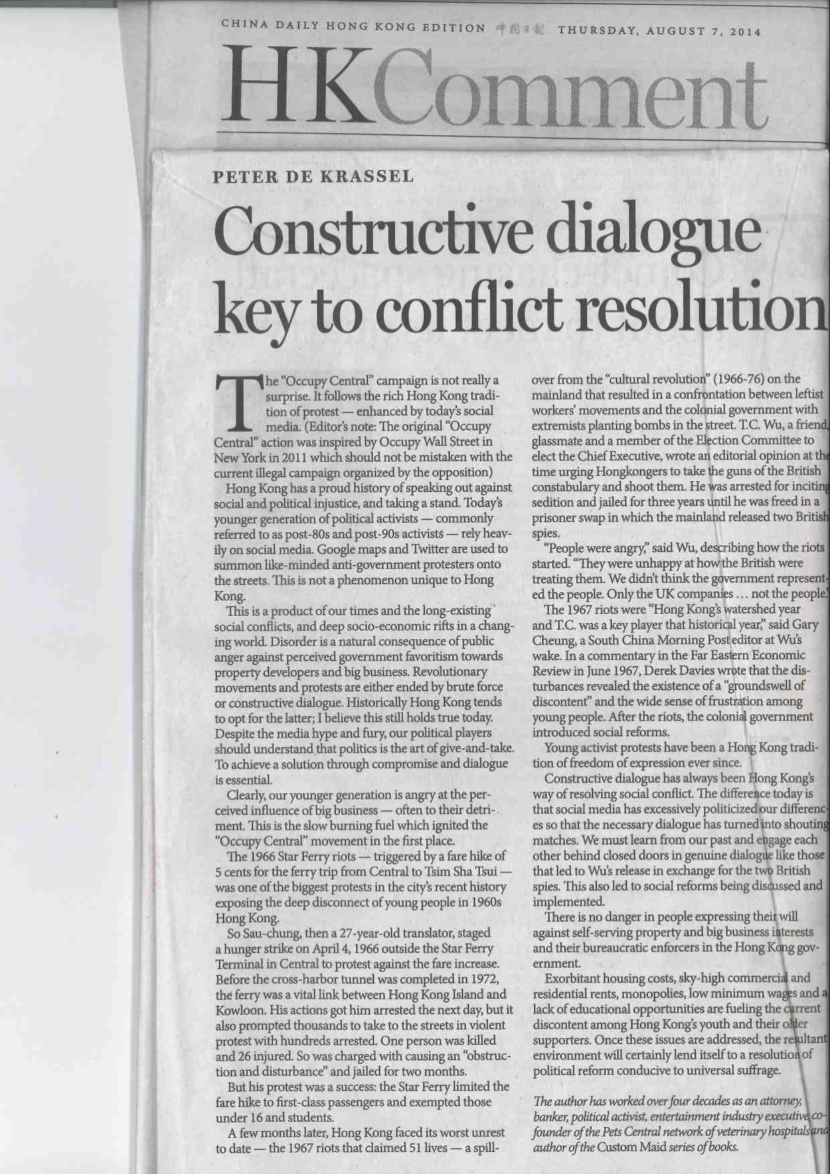By Peter de Krassel
The “Occupy Central” campaign is not really a surprise. It follows the rich Hong Kong tradition of protest — enhanced by today’s social media. (Editor’s note: The original “Occupy Central” action was inspired by Occupy Wall Street in New York in 2011 which should not be mistaken with the current illegal campaign organized by the opposition)
Hong Kong has a proud history of speaking out against social and political injustice, and taking a stand. Today’s younger generation of political activists — commonly referred to as post-80s and post-90s activists — rely heavily on social media. Google maps and Twitter are used to summon like-minded anti-government protesters onto the streets. This is not a phenomenon unique to Hong Kong.
This is a product of our times and the long-existing social conflicts, and deep socio-economic rifts in a changing world. Disorder is a natural consequence of public anger against perceived government favoritism towards property developers and big business. Revolutionary movements and protests are either ended by brute force or constructive dialogue. Historically Hong Kong tends to opt for the latter; I believe this still holds true today. Despite the media hype and fury, our political players should understand that politics is the art of give-and-take. To achieve a solution through compromise and dialogue is essential.
Clearly, our younger generation is angry at the perceived influence of big business — often to their detriment. This is the slow burning fuel which ignited the “Occupy Central” movement in the first place.
The 1966 Star Ferry riots — triggered by a fare hike of 5 cents for the ferry trip from Central to Tsim Sha Tsui — was one of the biggest protests in the city’s recent history exposing the deep disconnect of young people in 1960s Hong Kong.
So Sau-chung, then a 27-year-old translator, staged a hunger strike on April 4, 1966 outside the Star Ferry Terminal in Central to protest against the fare increase. Before the cross-harbor tunnel was completed in 1972, the ferry was a vital link between Hong Kong Island and Kowloon. His actions got him arrested the next day, but it also prompted thousands to take to the streets in violent protest with hundreds arrested. One person was killed and 26 injured. So was charged with causing an “obstruction and disturbance” and jailed for two months.
But his protest was a success: the Star Ferry limited the fare hike to first-class passengers and exempted those under 16 and students.
A few months later, Hong Kong faced its worst unrest to date — the 1967 riots that claimed 51 lives — a spillover from the “cultural revolution” (1966-76) on the mainland that resulted in a confrontation between leftist workers’ movements and the colonial government with extremists planting bombs in the street. T.C. Wu, a friend, glassmate and a member of the Election Committee to elect the Chief Executive, wrote an editorial opinion at the time urging Hongkongers to take the guns of the British constabulary and shoot them. He was arrested for inciting sedition and jailed for three years until he was freed in a prisoner swap in which the mainland released two British spies.
“People were angry,” said Wu, describing how the riots started. “They were unhappy at how the British were treating them. We didn’t think the government represented the people. Only the UK companies … not the people.”
The 1967 riots were “Hong Kong’s watershed year and T.C. was a key player that historical year,” said Gary Cheung, a South China Morning Post editor at Wu’s wake. In a commentary in the Far Eastern Economic Review in June 1967, Derek Davies wrote that the disturbances revealed the existence of a “groundswell of discontent” and the wide sense of frustration among young people. After the riots, the colonial government introduced social reforms.
Young activist protests have been a Hong Kong tradition of freedom of expression ever since.
Constructive dialogue has always been Hong Kong’s way of resolving social conflict. The difference today is that social media has excessively politicized our differences so that the necessary dialogue has turned into shouting matches. We must learn from our past and engage each other behind closed doors in genuine dialogue like those that led to Wu’s release in exchange for the two British spies. This also led to social reforms being discussed and implemented.
There is no danger in people expressing their will against self-serving property and big business interests and their bureaucratic enforcers in the Hong Kong government.
Exorbitant housing costs, sky-high commercial and residential rents, monopolies, low minimum wages and a lack of educational opportunities are fueling the current discontent among Hong Kong’s youth and their older supporters. Once these issues are addressed, the resultant environment will certainly lend itself to a resolution of political reform conducive to universal suffrage.
The author has worked over four decades as an attorney, banker, political activist, entertainment industry executive, co-founder of the Pets Central network of veterinary hospitals and author of the Custom Maid series of books.

